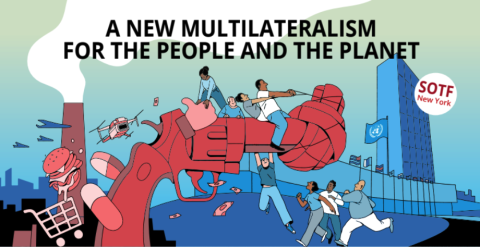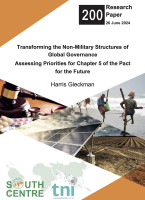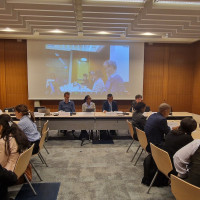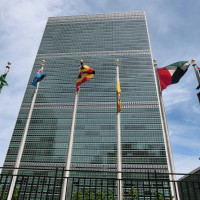A new multilateralism for the people and the planet
Topics
Regions
Global governance is at an inflection point. Multiple crises are affecting people and the planet: continuing and escalating wars, genocide in Palestine, increasing inequalities and wealth concentration, relentless attacks on human rights and democracy, ecological destruction and climate and biodiversity crises, collapse of public services and infrastructure, increasing levels of gender violence and food insecurity. All of these crises have at their core neoliberal globalization, transnational corporations, and unaccountable power.
More recently, far-right politics has gained much ground globally and has further weakened the damaged multilateral system. This has led to the normalization of ethno-nationalist policies, denialism of science, and the polycrisis as well as to racist and sexist discourse, including hate speech against migrant and refugee people.

What has happened up to now?
Led by the Secretary General’s proposed Summit of the Future and its Pact for the Future, the former colonial powers and their allies insist that the way to address these crises and for a more “effective” multilateral governance is to bring transnational corporations and multistakeholderism inside the United Nations. Several decades of asymmetries and an undemocratic status quo, deepening the corporate capture of multilateral institutions have proven we need another way forward for the future of people and the planet. There are serious concerns that the Summit may in fact result in the deepening of existing trends.
What is happening in September?
This September gathering will bring together concerned social movements and popular sectors working on substantive changes in their sectors and across the UN system. There are many initiatives on the ground building alternative proposals that will come together in New York in the days just ahead of the official Summit of the Future. With this call, we invite you and your organization to join in the encounter and participate in advancing demands for a more effective, democratic and just multilateral system. Together we will put forward transformative solutions to our planet’s major problems and challenge the UN Secretary-General’s “UN 2.0” which brings a greater role for transnational corporations, multistakeholderism, and “networked governance”.
The agenda is being developed around the following aims:
- to unpack the five chapters of the Pact of the Future, as a departure point for a wider discussion on multilateralism, corporate governance strategies reflected in the Pact and identification of crucial ideas that were excluded from the Pact, and deepening the ongoing dialogue with states from G77+ China and the global south.
- to explore and assess steps toward building a multilateralism free of corporate capture and lay the basis for an ongoing public deliberation of UN 3.0 - one that meets people's needs, and restores the global environment.
We invite you and your organization to join this 19-21 September Encounter, so together we can block the further expansion of corporate control of international affairs and to further build the concept, proposals and plan of action for a new multilateralism from below – a UN 3.0 that will provide a transformative horizon and address the challenges of the 21st century.
Programme
| Thursday, September 19th | |
|---|---|
| Time | Description |
| 10:00hs | Opening Session Welcoming & presentation of the program by hosts and co-organizer. |
| 10:15hs | Geopolitics and multilateralism: State of play Structural and global power analysis and the position – or lack of it – of the UN today. Including the historical analysis of the different attempts to include the private sector in the UN decision-making process in the last 40 years (from UNCTC, Rio92, Johannesburg 2022 (Rio+10), Rio+20, to the World Economic Forum and Our Common Future) Initial Inputs by Yoke Ling, Third World Network, Malaysia Jomo Kwame Sundaram, Khazanah Research Institute, Malaysia Carlos Correa, South Center, Argentina Walden Bello, Focus on the Global South, Philippines Facilitate: Firoze Manji, Daraja Press, Kenya-Canada |
| 11:30hs | The multilateralism as it is discussed at SOTF. Social movements and CSO assessments Views on the SOTF process and the Pact from social movements, Indigenous peoples, peasants and other rural communities, marginalized communities, workers, youth, feminists, and community organizers. Initial inputs: Global Digital Ccompact: Anita Gurumurthy, Declaration on Future Generations: Miloon Kothari, Pact for the Future: Gonzalo Berrón. Facilitated plenary debate with participants. |
| 13-14:00 | Lunch |
| 14:00 | Assessment of efforts across the UN system to confront TNCs engagement in global governance: from the 2006 closing UNCTC to 2024 sessions of COPS and governing boards. Yesterday and Today. Dialogue on the different attempts to include the private sector in the UN decision-making process from the 2006 closing of UNCTC to the 2024 sessions of COPS, governing boards, and special high-level events in the last 40 years, from closing of UNCTC to the World Economic Forum, COVAX, World Food System, Internet Governance Forum and SOTF. Initial Inputs by Internet Governance Forum, Nandini Chami, IT for Change CFS & CSIPM Data Working Group, Soledad Vogliano, ETC World Health Organization, Lauren Paremoer, PHM Food Systems, Emily Mattheisen, FIAN Peace & Security, Sean Conner, IPB Facilitation and concluding remarks: Martin Drago, FOEI |
| 16:00 | Coffee |
| 16:30 | The future of multilateralism after the Summit of the Future. Dialogues with key State Delegations Strategic dialogue with states on how they envisage multilateralism and global governance post-SOTF. Views from Global South missions on the governance advancements and missed opportunities in Pact for the Future and annexed Declarations. Interventions by Jesse Musinguzi, Permanent Mission of Uganda to the UN (On behalf of the Chair of the G77 + China) Amb. Akram Munir, PR of Pakistan to the UN (Like-Minded Countries) Delegate from South Africa Mission in NY. Delegates from Brazil, Colombia, Philippines, tbc. Moderation: Harris Gleckman & Brid Brennan |
| 19:00 | End of the day |
| Friday, September 20th | |
|---|---|
| Time | Description |
| 10:00 - 10:45 | A look at various global governance proposals that could be the basis for common positions – part 1 Presentations and dialogue on economic governance of globalization and neo-liberalism. Including the relationship between the UN, the BWI, and WTO and between the GA and a parliamentary assembly and citizen’s assembly Inputs: Nicoletta Dentico (SID), Tony Salvador (TWN), Andreas Bummel (Democracy Without Borders) |
| 10:45 11:30 | A look at various global governance proposals that could be the basis for common positions – part 2 Presentations and dialogue on environmental governance of globalization and neo-liberalism Inputs: Nathalie Rengifo (CA) and Kirtana Chandrasekaran (FoEI Climate Justice and Energy Program Co-coordinator) (on line). Facilitation: Ronnie Hall, ETC Group |
| 11:30 11:45 | Coffee break |
| 11:45 12:30 | A look at various global governance proposals that could be the basis for common positions – part 3 This session will highlight the prevailing institutional deficits in global digital governance, reflect on what changes (or not) with the advent of the Global Digital Compact, and identify critical priority actions for global civil society in the current context in terms of strengthening global digital governance arrangements from a human rights and justice standpoint, with attention to emerging challenges in the data and AI paradigm. Session moderator: Anita Gurumurthy, IT for Change Presenters Nandini Chami (IT for Change), Paloma Lara Castro (Derechos Digitales) & Barbara Ntambirweki (ETC Group) |
| 12:30 13:30 | A look at various global governance proposals that could be the basis for common positions – part 4 Presentations and dialogue on development, globalization and neo-liberalism. UN Human Rights important negotiations: Human Rights, Transnational companies and other Businesses, Right to development. Inputs: Murat Akincilar (CETIM), Barbara Adams (GPF) & Joseph Purugganan (Focus on the Global South) Facilitation: Emily Mattheisen, FIAN |
| 13:30 14:30 | Lunch |
| 14:30 16:00 | Multilateralism we want/need. How do we get to a democratic and participatory multilateral system? What social movements, indigenous peoples, peasants and other rural communities, marginalized communities, workers, youth, feminists, and community organizers want from global governance. Intro and Moderation: Harris Gleckman, TNI Inputs: Kaira Reese (TUCA), Natalia Lobo (WMW), Martin Drago (FOEI), Vernor Muñoz (GCE), Grace Mtonga (HIC/ESCR-NET), Georgios Kostakos (FOGGS), Chris Smalls , President Amazon Labor Union (tbc) |
| 16:00 | Coffee |
| 16:30 19:00 | Social Movements strategies in a hostile world Strategy session: Go in depth in the “selected” strategies: goals, guidelines, possible actions, and calendar. Proposals for countering corporate moves on multilateralism across the international system from actions in capitals to bring proposals for actions in and outside the doors of upcoming 2024/2025/2026 international negotiations to the spaces social movements articulate for that: 2025 Climate COP, 2025 FFD, World Social Summit, 2025 Plastics, Pandemic treaty… Moderation Team: Ronnie, Brid, Joseph, Martin, Lauren, Nicoletta. |
| 19:00 21:00 | A chat over dinner about the politics of United State. Venue: Mezzanine at the The People's Forum |
Saturday 21st Venue: Violeta Parra Stage, The People's Forum, 320 West 37th Street, New York, NY 10018
| |
|---|---|
| Time | Description
|
11:00 12:30 | The Global Data Compact We Need: A forward-looking agenda Off-site Event organized by Global Digital Justice Forum with member states Colombia and Portugal, UN Trade and Development, UNOHCHR, IT for Change, Derechos Digitales, FIAN International and Research ICT Africa. (concept below) |
| 12:45 14:00 | Multilateralism from below for the planet and the people. Public Event organized by FOEI, TNI, Focus on the Global South, IT for Change, GCE, FIAN, PHM, South Center (concept below). |
Organized by: Friends of the Earth International (FOEI), the Transnational Institute (TNI), Focus on the Global South, IT for Change, the Global Campaign for Education (GCE), FIAN International, ESCR-Net, Corporate Accountability, and the People's Health Movement (PHM).
Speakers and panelists
-
Harris Gleckman
TNI associate

-
Brid Brennan
Project Coordinator Corporate Power

-
Gonzalo Berrón
Researcher TNI



